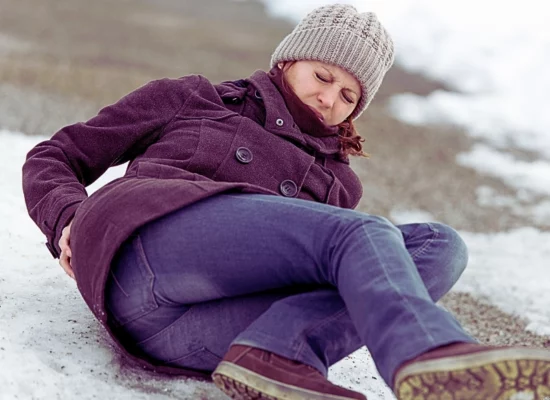Slip and fall accident claims are a category of personal injury claims that fall under premises liability law. These cases involve injuries sustained due to hazardous conditions on a property that needed to be addressed or eliminated. If a property owner neglects to take reasonable steps to ensure the safety of their premises, you may be able to hold them accountable for injuries you incur on their property.

If you’ve suffered an injury on someone else’s premises, contact Dodds Law Office at (309) 807-3600 to pursue compensation.
When Can You Sue for a Slip and Fall?
The Illinois Premises Liability Act outlines the responsibilities of property owners to ensure their land is safe for visitors. A property owner or occupier may be held accountable for unsafe conditions if they fail to uphold this duty of care.
To succeed in an Illinois slip and fall claim, you must demonstrate four elements of negligence:
- The landowner owed you a duty of care.
- The duty of care was breached.
- You sustained an injury.
- Your injury resulted from the breach of duty.
Generally, under the Illinois Premises Liability Act, you will be successful if you can prove the following:
There Was a Hazardous or Dangerous Condition on the Premises When the Accident Occurred
You need to demonstrate that a hazard existed at the location of your injury, such as a slippery floor, loose cables, uneven flooring, inadequate lighting or any other hazard that caused you to slip and fall. If it’s safe, take photos of the hazard as evidence right after the incident.
The Property Owner Either Was Aware or Should Have Been Aware of The Hazard or Defective Condition
To prove this element, you can present evidence that the property owner either was aware of or should have been aware of the hazardous condition. For instance, if an employee reported a spill in a store to the owner, the owner was informed about the danger. Generally, landowners should regularly inspect their property to identify hazards and either alert visitors to these dangers or resolve the issues.
The Property Owner Did Not Take Reasonable Steps to Protect People on the Premises from the Hazard
Under Illinois law, landowners must use “reasonable care” to ensure their property is safe for visitors, though the specifics can vary by situation. If a landowner is aware of a hazard, but fails to address it or warn visitors, they may be liable for injuries. Examples include not cleaning up spills or failing to maintain escalators and walkways, leading to dangerous conditions or poor visibility.
What Illinois Law Doesn’t Require
Illinois law does not outline specific actions a property owner must take in every situation, but it does clarify responsibilities that are not required. The duty of care does not obligate a landowner to:
- inform visitors about, or safeguard them from, hazards they already are aware of, dangers that are clearly visible, or conditions they should reasonably be able to identify themselves
- alert visitors to dangerous situations that the landowner is unaware of
- caution visitors about the dangers of improperly using the property, or
- prevent visitors from misusing the property on their own.
Due to the Property Owner’s Failure to Eliminate the Hazard, You Suffered a Slip and Fall Injury
To file a successful claim, you must have experienced some type of personal injury or damage. If you haven’t incurred damages, there is no compensation to pursue from the property owner.
What Compensation Can You Seek for Slip and Fall Injuries?
Victims of slip and fall accidents in Illinois often face serious injuries and mounting medical bills, which can lead to financial strain and loss of employment. The compensation for slip and fall injuries an accident victim receives through settlement or litigation can vary. It’s important to understand how claim value is determined to understand what your case may be worth. There are two main types of damages: economic and non-economic.
Economic Damages
Economic damages, often called tangible or monetary damages, have a calculable dollar value. They reflect costs incurred from an accident, including current and future medical expenses, long-term care for permanent injuries, rehabilitation therapy, and necessary medications. Additionally, you can claim damages for lost wages due to missed work during recovery and for any future income loss resulting from reduced earning capacity.
Non-Economic Damages
Non-economic damages encompass physical pain, emotional distress, and mental anguish due to injuries. This includes claims for fear, anxiety, depression, or insomnia. In cases of a fatal Home Depot accident, you can seek loss of consortium. Additionally, if scarring or disability affects your self-esteem, that can also be claimed.
How to File a Slip and Fall Lawsuit
To file a slip and fall lawsuit in Illinois, gather evidence like photos of the hazard, witness statements, and injury details. Next, consult a slip and fall injury lawyer to draft and file a complaint in the appropriate court, demonstrating that the property owner was aware of or should have been aware of the unsafe condition.
Seek Medical Treatment
Injuries from slip and fall accidents can be significant, leading to more than 1 million emergency visits to the hospital in the U.S. every year. You should get prompt medical attention following a slip and fall accident, even if the injuries appear minor. A medical professional’s evaluation may uncover additional injuries or identify those worsened due to the incident.
Medical treatment can help substantiate your slip and fall claim by providing a record of your injuries throughout the legal proceedings. Typically, slip and fall cases are resolved within 9 to 12 months after treatment is finalized. This generally suggests that cases, where medical care is received quickly, will settle sooner than those with delays or gaps in treatment.
File an Accident Report
The next step in a slip and fall lawsuit is to file an accident report, especially if the incident occurred at a business. It’s important to inform the property owner or on-duty manager about the accident, whether on private or public property. If the incident occurred at your workplace, reach out to a supervisor. Most businesses have policies to follow, which can aid in documenting the accident and ensuring medical assistance is provided if necessary.
In many instances, you’ll need to sign the accident report, which will detail the time, location, and known injuries resulting from the incident.
Gather Evidence
To ensure you have a strong personal injury claim, gather evidence such as photographs, video footage, medical records, and pain journals. Prepare documents like medical bills and witness statements as well.
Navigating evidence collection and investigation can be challenging and costly. Hiring a personal injury lawyer may help manage this process. Document key details such as the accident location, date and time, accident report, cause of the accident, witness information, relevant photographs, medical records, and proof of lost wages.
Photographs of hazardous conditions and injuries are vital for your slip and fall claim. Ensure these images clearly show the scene and any progression of injuries over time.
Contact an Attorney
Consult a slip and fall accident lawyer who knows the important points of a personal injury case to navigate your claim effectively. They can answer legal questions, assess the viability of your claim, and help gather evidence. They can also protect you from ill-intended insurance adjusters. Claims that go unrepresented by an attorney secure lower settlement amounts. With their assistance, your chances of receiving compensation increase significantly. An attorney can also determine the value of your claim and begin building your case, including interviewing expert witnesses and establishing negligence. Your attorney can negotiate a settlement or take your case to court if necessary.
Send a Demand Letter
After establishing fault and building your case, your lawyer will likely send a demand letter to the at-fault party. This letter outlines your personal injury claim, explains how their negligence caused your injuries, and requests compensation based on the losses you sustained. You and your attorney will then await a response from the at-fault party or their insurance company.
Begin Settlement Negotiations or File a Lawsuit
Often, the insurance company and attorney representing the defendant will attempt to negotiate a mutually acceptable settlement before any lawsuit is initiated. Your personal injury lawyer will manage this negotiation process on your behalf. In most cases, both sides reach an agreement and the case is settled. However, if a settlement cannot be achieved, your attorney will proceed to file a lawsuit for you.
If the defendant’s insurance company or lawyer declines to provide a reasonable settlement or disputes the incident, your attorney will initiate the litigation process by submitting a lawsuit. If you or a loved one has suffered an injury from a slip and fall accident, contact us at Dodds Law Office to begin your slip and fall case.

